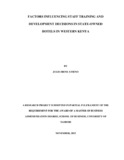| dc.description.abstract | The 21st century has more than sufficient evidence of unprecedented changes in the environment that have rendered a new sense of urgency to businesses of the need to incorporate training and development in the organization strategy in order to ensure survival and prosperity. This therefore means that employees have to be trained more often for purposes of improving their skills as the workforce is changing day in day out. An educated and well trained workforce is considered to be essential to the maintenance of a firm’s competitive advantage in a global economy. Training focuses on imparting short-term knowledge and skills to enable employees perform in their current job while development has a long-term focus to prepare the employee to take on greater responsibilities in future. Training and development like any other Human Resource Management function can be very wasteful if not cautiously planned, designed and implemented within all firms. Conducting a thorough needs assessment before training is designed and delivered helps set appropriate goals for training and ensure that trainees are ready to participate. State run corporations which include, Kisumu hotel, Sunset hotel, Kericho Tea Hotel, Golf Hotel Kakamega have failed to maintain a competitive edge against privately run hotels in western Kenya and there is a strong need for its employees to be trained on how to handle different people and how to improve their own understanding of their physical and psychological environment in order to better serve customers. Amongst the factors influencing training and development in the hotel industry include internal organizational factors and external factors. Lack of time, high employee turnover, high business demands, cost and lack of resources has been a major barrier to training and development within the Hospitality sector. The objective of this research was to establish factors influencing staff training and development decisions in state owned hotels in Western Kenya. This study was guided by resource based theory and human capital theory. The researcher employed a case study and the target population comprised the four state-owned Hotels in Western Kenya. These state owned Hotels are Kisumu hotel, Sunset hotel, Kericho Tea Hotel, and Golf Hotel Kakamega. In using Primary source data was gathered using Semi-Structured questionnaires comprising qualitative and quantitative questions. Structured items were anchored on a Likert-type scale. The Statistical Package for the Social Sciences (SPSS) computer software was used for the analysis. Measures of central tendency (mean) frequencies and percentages were used to describe and summarize the research findings. The results were presented in tables and charts. The study established that the major factors influencing staff training and development decisions in the State-Owned Hotels in western Kenya were the need to enhance productivity and improve performance, introduction of new approaches and processes to business and the need to match employee specifications with the job requirements and stake holders’ needs. Human resources are the key asset in organizational survival and yet most of the State Owned hotels consider the human relation factors to a moderate extent while formulating their T&D decisions. Therefore, the researcher recommends that greater emphasis on the needs and welfare of the employees should be taken into account by the managers when formulating T&D decisions. | en_US |

